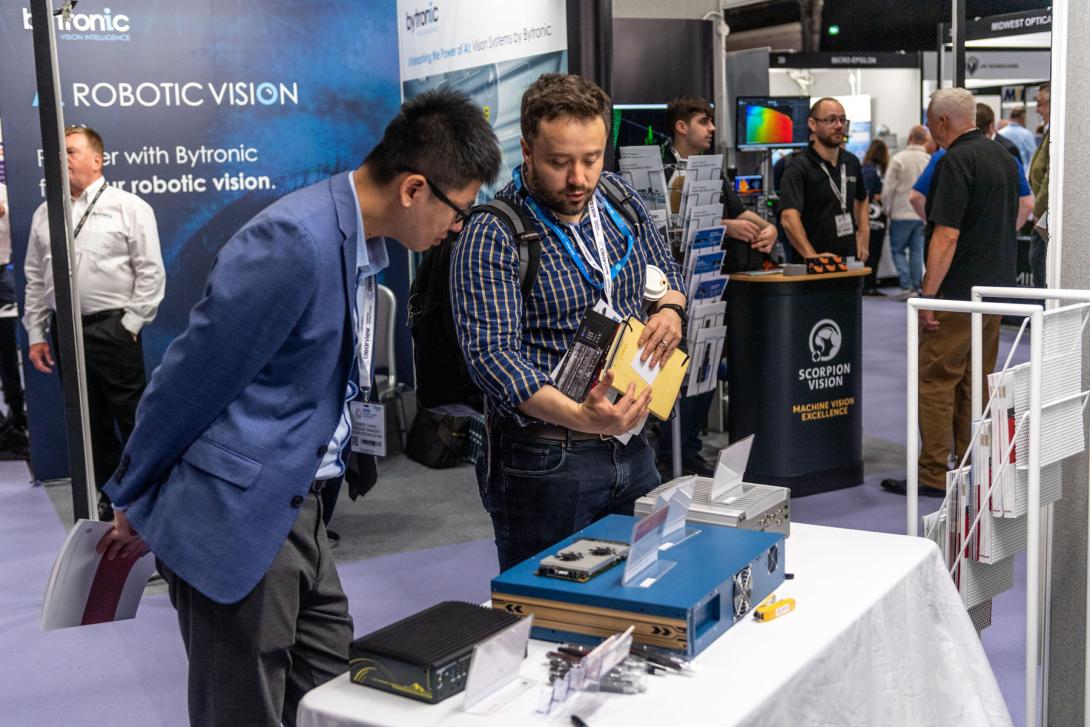The UK Industrial Vision Association (UKIVA) has announced that the first two integrators have joined its new Vision Integrator Standard.
Laurie Barnes, CTO at Automate UK, told audiences at the Machine Vision Conference (MVC) at Coventry Arena this week that Scorpion Vision and Acrovision were the founding integrators to join the initiative. Developed to help system integrators stand out in the marketplace and win more business, as well as to improve the overall standard of the system integration sector in the UK, the Standard will set out the key areas UKIVA considers to be crucial to all integrators operating in the competitive industry, while it will also aid end users of vision equipment to select a vision integrator for their next project.
Barnes outlined why UKIVA and Automate UK have developed it: “Why do we need a standard? Vision is a keystone that everyone on this side of the exhibition needs to make their machines [the MVC was co-located with the Automation UK conference this year]. But it’s not just about barcodes and product detections. It’s also about quality, orientation, positions, dimensions, colours, 3d, text and even texture, and all the non-visible elements of vision as well.”

The Machine Vision Conference (MVC) brought together industry experts and business leaders, promoting and educating on the latest innovations in image processing technologies. Image UKIVA
“As the BSI (British Standards Institution) says, standards are the blueprints for excellence, but they are also a way of providing robust strategies… a way for you to stand out as a business that strives to be the best in industry. The standard gives your business a guide to processes that make your organisation one that others want to work with. It shows that you follow best practice, ensuring that your projects are the best quality that you aim to supply systems to customers that solve their challenges.”
Barnes said that part of creating and signposting processes is the importance in getting the information right “especially for vision”.
“The standard aims to set out these class-leading processes that aim to help your customers’ projects become a success. Within the vision industry, we know that it's not always cut and dried. There are numerous elements that can derail projects without warning – we're talking about lighting, reflections, textures and products… it just goes on and on. Following the process laid out in the Integrator Standard goes a long way to help you and your customers avoid these pitfalls.”
Among the areas that the standard proposes to audit are safety, acceptance testing, aftersales support, staff training, customer training and proof-of-concept. “The standards that we should be adhering to are a way to make sure that you're in line with your customers and they’re in line with you,” said Barnes.
Paul Wilson, Managing Director of Scorpion Vision, echoed this point. "When customers engage with vision integrators such as Acrovision and Scorpion Vision on what can be challenging problems to solve and may require a not-insignificant investment, this programme will surely offer them some peace of mind that they are working with businesses that have been independently assessed and validated and reassure them that they are working with credible partners."
Paul Cunningham, Managing Director of Acrovision, told delegates why it got involved with the initiative: “There is still a lot of competition in the vision integrator market in the UK. We therefore know that Acrovision must somehow positively differentiate ourselves from our competition. We spend a lot of time and money training up our staff, investing in demo kits, lab equipment, to help us provide our customers with the most robust and cost-effective solutions that we can.”
He said that the initiative acknowledged that “not all integrators are the same and there should be some recognition for those that are meeting certain business quality criteria” but that it also went beyond the installation of a business system.
“It's how financially secure that business is; what is the quality and experience of the employees and the training provided to them; what quality standards and business processes do they adhere to; what is the range of services that they offer?
“Is it just entry-level sensors or does that integrator supply everything up to and including 3D ignition systems, AI deep learning solutions, etc. But also, what are the other value-added offerings of that integrator? Do they provide customer training, aftersales support, additional technology services, such as report generation; bespoke front-ends – these are all add-ons that differentiate some integrators from from others.”


